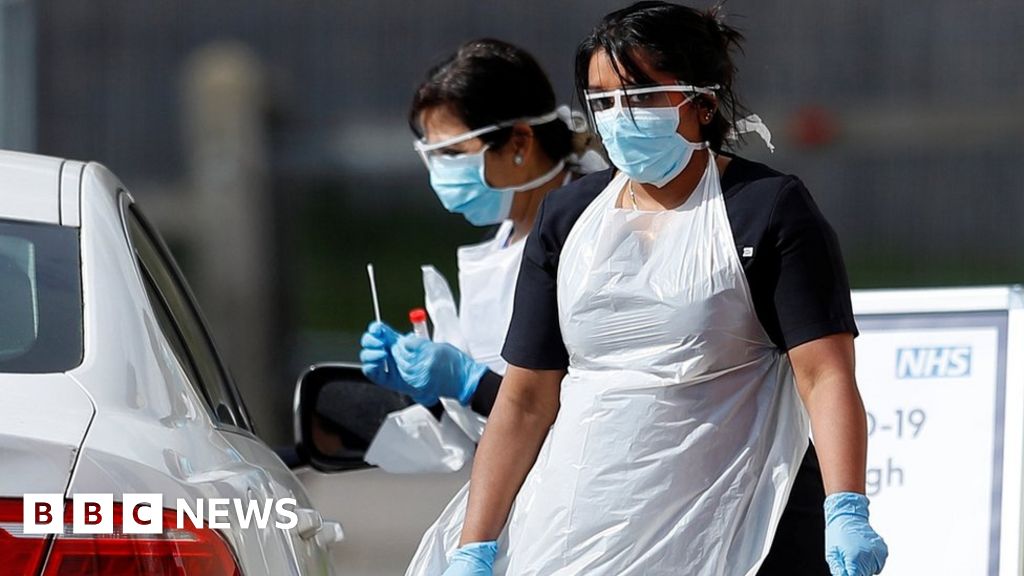
The number of people to have died with the coronavirus in the UK has reached 1,019.
The latest government figures on Saturday showed there were another 260 deaths in the UK in a day, up from 759 on Friday.
There are now 17,089 confirmed cases in the UK.
It comes as the government said it was ramping up testing for frontline hospital staff who have symptoms, or who live with people who have symptoms.
Critical care doctors and nurses will be prioritised first, with testing expected to follow for A&E staff, paramedics and GPs.
In Wales, Scotland and Northern Ireland, health workers are already being tested.
The jump in deaths is the biggest day-on-day increase the UK since the outbreak began. The number of deaths is 34% higher than Friday's figure.
The new figures include a further 246 people in England, with patients aged between 33 and 100 years old. All of them had underlying health conditions except 13 people, who were aged 63 and over.
In Scotland, 40 people have died so far in total, while the figure in Wales is 38. Northern Ireland has seen a total of 15 deaths.
The Department of Health and Social Care also corrected figures that it shared on Friday, saying the number of confirmed cases was 36 fewer than it had tweeted, at 14,543.
Among the latest public figures to announce they have tested positive for the virus is Scottish Secretary Alister Jack, who is self-isolating.
Prime Minister Boris Johnson and Health Secretary Matt Hancock are self-isolating after testing positive for the virus. England's chief medical officer, Prof Chris Whitty, is also self-isolating, but has not tested positive.
Former Cabinet Secretary Gus O'Donnell said politicians needed to "obey their own rules much more strictly" on social distancing.
In other developments:
- The car park of Chessington World of Adventures in Chessington has become a temporary drive through testing station for NHS workers
- Photos showed work under way to turn London's ExCel centre into a temporary hospital with capacity for 4,000 people
- Two new temporary hospitals will be set up in Birmingham and Manchester to help the NHS cope with the virus
- County councils are warning residents some services, such as recycling centres and adult education centres, will be significantly scaled back or stopped to prioritise keeping people safe from coronavirus
- The Local Government Association says council workers are being physically and verbally abused for implementing the government's social distancing policy. Workers have been spat at, sworn at and racially abused, it said
- The Mayor of Greater Manchester, Andy Burnham, said he had received about 300 complaints from employees and the public about businesses not following social distancing guidelines.
- The HCSA hospital doctors' union said potential supply issues should not delay the reported introduction of more stringent guidance on the use of personal protective equipment by frontline NHS staff.
The total number of people tested for the virus in the UK was 120,776, as of Saturday morning.
Currently, about 6,000 people are tested daily, but the government wants to increase that number to 10,000 a day by the end of March and 25,000 a day by mid-April.
The British Medical Association said the move towards testing NHS staff in England was "long overdue", following concerns that healthy members of staff may have been self-isolating at home when they did not need to.
The new tests being offered to frontline NHS staff - and which have already been used to check very ill patients in hospitals - are antigen tests, which indicate if someone is currently infected and risks spreading it to others.
Another type of test, called the antibody test, indicates whether someone has recently had the virus. It is not available to the public yet but Public Health England is ordering it in.
Over the weekend, the first of three new testing labs are expected to start work to process 800 samples, the government said. Samples will be taken around the country, initially focusing on coronavirus hotspots such as London.
Dozens of universities, research institutes and companies are lending equipment for the labs.
https://news.google.com/__i/rss/rd/articles/CBMiJGh0dHBzOi8vd3d3LmJiYy5jb20vbmV3cy91ay01MjA3Nzk5N9IBKGh0dHBzOi8vd3d3LmJiYy5jb20vbmV3cy9hbXAvdWstNTIwNzc5OTc?oc=5
2020-03-28 23:11:30Z
CBMiJGh0dHBzOi8vd3d3LmJiYy5jb20vbmV3cy91ay01MjA3Nzk5N9IBKGh0dHBzOi8vd3d3LmJiYy5jb20vbmV3cy9hbXAvdWstNTIwNzc5OTc



